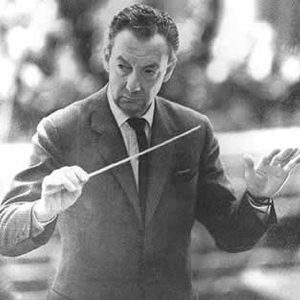« Back to Composer Index
Benjamin Britten
Info
11/22/1913
Lowestoft, England
12/04/1976
Aldeburgh, England
England
20th Century
Lowestoft, England
12/04/1976
Aldeburgh, England
England
20th Century
Biography
Benjamin Britten was born in Lowestoft, England, a fishing port and seaside resort about 100 miles northeast of London. His father was an affluent dental surgeon and his mother was an accomplished amateur singer.
Britten was extraordinarily precocious; he composed songs before he could read or write. He had completed a string quartet and an oratorio by age nine, and by the time he was 14 he had written a symphony, five more string quartets, ten piano sonatas, and several other smaller works. His "Simple Symphony", dating from 1934, contains many of the melodies and themes from these early works.
He studied viola with Audrey Alston, composition with Frank Bridge and John Ireland, and piano with Arthur Benjamin and Harold Samuel. Britten was an outstanding student at the Royal college of Music; he won the Earnest Farrar Prize for composition and, as a pianist, was awarded the title of Associate of the Royal College of Music. He had several composition published between 1932 and 1935.
Britten was obliged to earn his living after the death of his father in 1935. He worked at the Government Post Office Film Unit for four years. During this time he continued to compose, and his compositions were being performed increasingly. His "Variations on a Theme by Frank Bridge," his most significant composition up to that time, premièred at the Salzburg Music Festival in 1937.
In 1939 Britten visited New York City for the American première of the "Frank Bridge Variations." He lived briefly in Brooklyn, visited California, and then settled on Long Island for three years. There he worked on his Violin Concerto, the song cycle Les Illuminations, and his Sinfonia da Requiem. The Sinfonia expressed both his grief at the death of his father and his despair at a world plunged into war. Britten returned to England in 1942. He was an avowed pacifist, and he refused to serve in the British armed forces. An appellate tribunal officially exempted him from all military duty on the grounds of pacifism and complete dedication to the war effort through music, and he gave many concerts in bomb shelters and hospitals. In retrospect, in spite of Britten’s wartime contributions, it is clear that his pacificism cost him a knighthood, an honor bestowed sooner or later on virtually every prominent British musician; for in the long list of honors for the last 50 years, Britten’s name was conspicuous by its absence. The tenor Peter Pears, Britten’s lifelong friend, was knighted only after Britten’s death, and finally, Britten, too, received a posthumous award.
Britten’s first successful opera was his "Peter Grimes" (1945), and it was a milestone in his career. Britten’s other major operatic compositions are "The Rape of Lucretia" (1946); "Albert Herring" (1947); "Let’s Make an Opera" (1949); "Billy Budd" (1951); "Gloriana" (1953; written for the festivities following the coronation of Queen Elizabeth II); "The Turn of the Screw" (1954; an opera based on Henry James’ novel of that name); and "A Midsummer Night’s Dream" (1960). Several non?]operatic compositions of Britten are also important landmarks in his career. His 1949 "Spring Symphony," commissioned by the Koussevitzky Music Foundation and introduced at the Holland Music Festival, was a major work for soloists, chorus, and orchestra. Fourteen poems on the springtime theme are drawn together in musical praise of Spring. "A War Requiem" (1962) was written for the celebration of the Consecration of the restored St. Michael’s Cathedral, Coventry. The text is based partly on the traditional Mass and partly on poems by Wilfred Owen, a poet killed during the first World War only one week before the Armistice. Much of the impact of the Mass lies in Britten’s skillful combination of sacred and secular texts.
Britten’s three church parables date from the 1960s. "Curlew River" (1964) was an adaptation of a Japanese Noh play into a medieval miracle play. "The Burning Fiery Furnace" (1966) and "The Prodigal Son" (1968) complete the trio; all three are sung, played, and acted by a cast of monks.
"Voices of Today" was written in 1965 as part of the celebrations of the United Nations twentieth anniversary. It was performed on United Nations Day, October 24, 1965, in the General Assembly Building of the United Nations in New York City.
Britten lived in Aldeburgh, Suffolk, from 1942 until his death. He believed in roots, in associations, in backgrounds, and in personal relationships. Britten led an inflexible, rigorously self-disciplined life that included long walks, driving his Alvis car at high speed, and several daily dips in his swimming pool on summer days. He stated emphatically that he wrote music for the people of Aldeburgh and for the present - he was not interested in writing music for posterity. He considered that the quality of music began to deteriorate with Beethoven: before Beethoven composers wrote for the glory of God, for their countries, for a social environment; after Beethoven each composer became the center of his own universe and the Romantic era was born. Britten stated that he tried to model himself on Stravinsky, whom he regarded as a composer who had freed himself from the tyranny of the purely personal. Not surprisingly, Britten, like Stravinsky, had no set musical style; he wrote in many different ones.
- Ted Wilks


